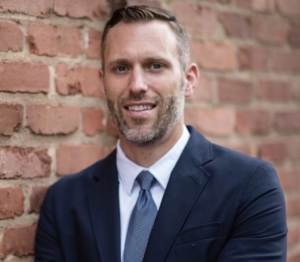 Meet Kris Elliott (he/him), Ph.D., associate director of the Oregon State University (OSU) Extension Service and a valued member of ACTE’s inclusion, access, equity and diversity (IAED) advisory group. We’re so glad he took time out of his busy schedule to chat with Techniques. Because, in conjunction with a new IAED webinar series that launched this fall, we’re planning a big book club event in April 2023. He hopes you’ll be there!
Meet Kris Elliott (he/him), Ph.D., associate director of the Oregon State University (OSU) Extension Service and a valued member of ACTE’s inclusion, access, equity and diversity (IAED) advisory group. We’re so glad he took time out of his busy schedule to chat with Techniques. Because, in conjunction with a new IAED webinar series that launched this fall, we’re planning a big book club event in April 2023. He hopes you’ll be there!
Read more to find out what Elliott had to say about his experience in career and technical education (CTE), and how he believes courageous conversations are necessary for personal and professional growth.
Please share a little bit about yourself. What inspired your interest in CTE?
I didn’t grow up loving school. It was often hard for me to connect with what we were learning; I didn’t always get the “why” behind what we were doing. But that all changed in high school. As a rural kid with a farm background, I enrolled in the agriculture program.
The combination of hands-on learning in the CTE classroom and the opportunity to further develop my skills in FFA ignited a passion for learning I hadn’t experienced before. Eventually, this passion led me to a career in CTE! I have worked as a high school ag teacher, a school district administrator, and now I work in extension and engagement at Oregon State University. My passion for CTE continues in my current role because I’ve seen the positive difference it can make in the lives of students.
What was your education experience like? What did you study?
I’ve always loved the intersection of agriculture and science. We experience challenges in producing enough food and fiber for our growing population while continuing to care for our natural world. I believe science and technology can help us overcome this challenge and being a part of this work is exciting.
Further, FFA helped me learn to communicate about agricultural issues. I started out as a shy ninth grader, but through participation in events and projects, I quickly learned how to advocate for agriculture and education issues. As a high school teacher, I found it rewarding to give back. Hopefully I inspired my students in the same way my agriculture teachers did.
What barriers did you face in pursuit of postsecondary education? How did you overcome those obstacles?
I was the first person in my family to go to college. And I experienced quite a few access issues, just because we didn’t know. I remember learning about requirements for financial aid, from a friend, after the FAFSA deadline. I remember struggling to complete college applications on my own, from home, on a 14k dial-up modem. And I also remember the financial struggle, without student aid, to make it through my first year of college.
Once I got there, my university offered many great resources for student aid and part-time jobs to assist with tuition and housing. And I did graduate with student loans but was able to pay them back over time; I also earned a few state grants to help pay back my loans. The good news is, I think the awareness and support for first-generation college students has come a long way since 1996 when I graduated high school. But there is still a lot of work to do in higher education affordability.
Please briefly discuss your role with ACTE’s IAED advisory group.
My passion for equity has grown and continued to grow during 20+ yearslong career in education. I want to work toward a world where students can truly thrive in high-quality CTE programs, regardless of their background, identity or ability. In particular, I work with ACTE’s IAED advisory group because there is important work to do in CTE. We need to break down stereotypes and ensure that our programs eliminate any bias or barriers to success. The IAED group, with the support of ACTE’s board of directors and staff, is helping to do just that. This is challenging work, and I appreciate the CTE educators and professionals who are leaning in to create more equitable opportunities for all of our students (and ACTE members).
In your opinion, what are the greatest challenges facing education in 2022–23? And how can CTE leaders act courageously to develop stronger, more inclusive learning environments for all?
Just as we started to see some positive change, some educators face policies and procedures that prohibit them from discussing race and sexual or gender identity. And this erases the identity of many of our students — and educators for that matter. These should not be political issues. Educators should be empowered to acknowledge students’ identities and their own. In order to learn, students need to feel safe, seen, cared for and loved.
This fall, ACTE launched a new webinar series exploring IAED in CTE. And there’s another project we’re really excited about: book club! What can Techniques readers expect to gain from that experience?
We know discussing issues of equity, particularly around race, can be challenging and even scary. What if we say the wrong thing? What if something I hear triggers me? How can we engage in a brave way? We can’t shy away from these difficult conversations anymore. This book club will provide us an opportunity to talk, share experiences, and encourage each other — in hopes we can all engage in a collaborative process to create more equitable CTE programs of study for all students.
Is there anything else you’d like to share?
As a queer man, I have experienced being othered, teased and bullied. I am passionate about this work because I want to ensure we create positive learning environments for all of our students. No student should ever feel less than. No student should feel they need to change who they are to fit in. We want every student to belong in our programs, and this requires that we, the adults, work toward creating inclusive spaces. Our students are counting on us.
Learn more and join the book club
Book club will occur as the culminating event of ACTE’s 2022–23 IAED in CTE webinar series — in April 2023. Those who wish to participate are encouraged to read one or both books listed below. Then consider how the work of Glenn E. Singleton, Ijeoma Oluo, Kris Elliott, the IAED advisory group and even you, yourself, can change people and hearts and entire organizations.
Courageous Conversations About Race: A Field Guide for Achieving Equity in Schools
Schools, like all organizations, face a nearly insurmountable hurdle when addressing racial inequities — the inability to talk candidly about race. In this timely text, author Glenn E. Singleton enables you to break the silence and open an authentic dialogue that forges a path to progress for racial equity.
So You Want to Talk About Race
The stakes could not be higher, and the task ahead seems daunting. Ijeoma Oluo guides readers of all races through subjects ranging from police brutality and cultural appropriation to the model minority myth in an attempt to make the seemingly impossible possible: honest conversations about how racism infects every aspect of American life.






